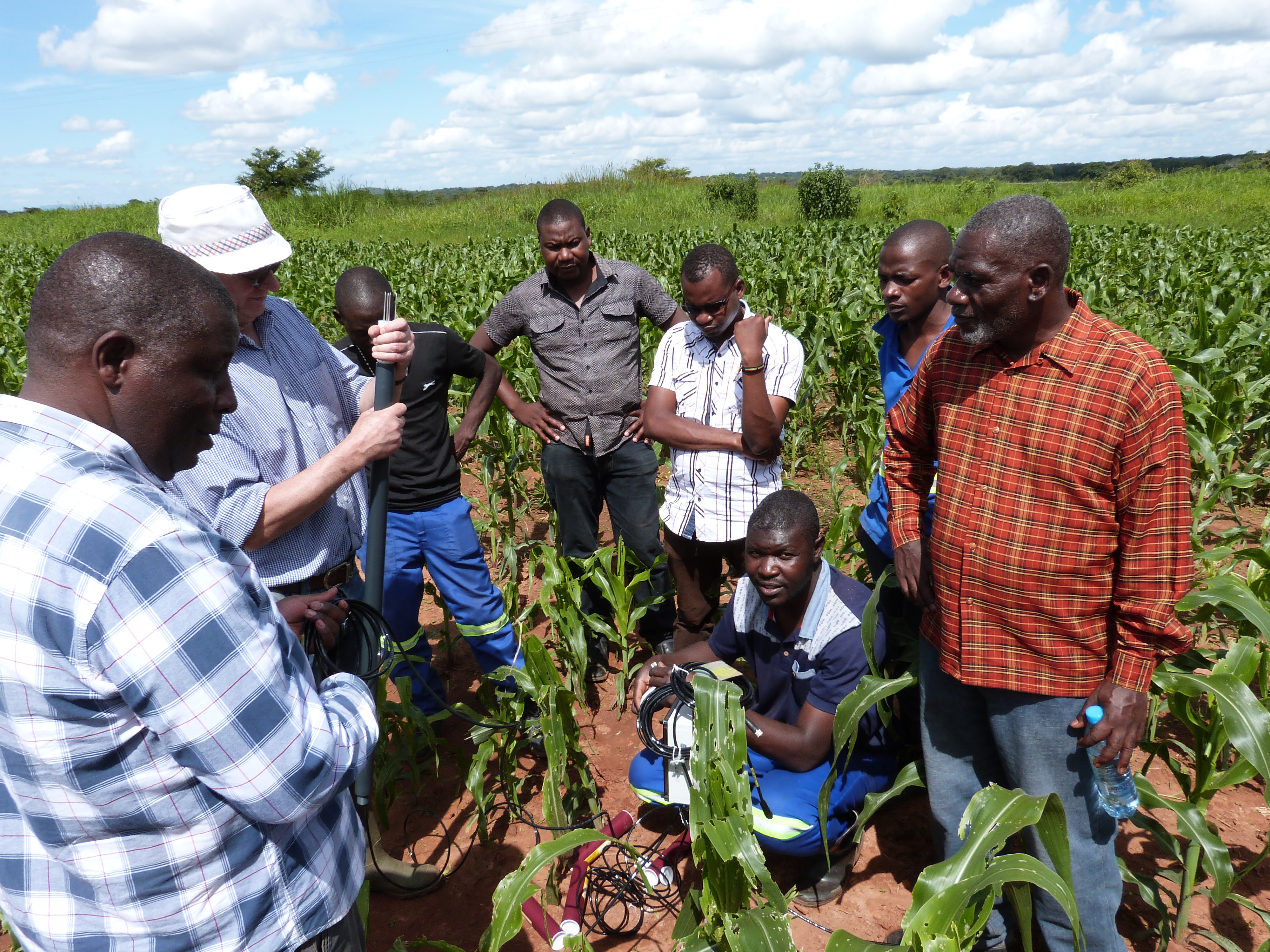
January 11, 2019, by Lexi Earl
CEPHaS: understanding soil water and its potentials for agriculture
Conservation agriculture (CA) is a set of practices which have been proposed to improve the resilience and sustainability of crop production, particularly in sub-Saharan Africa (SSA) where food security is endangered by the increasing frequency and intensity of drought seasons under climate change. In CA, the structure of the soil is not disturbed by cultivation, and crop residues and other biomass are retained on the soil surface to protect it against erosive rainfall and to enhance its carbon status. CA also relies on crop management (rotations and intercrops) to manage pests and diseases.
However, our understanding of CA systems in Africa is limited, and there are particular gaps in our knowledge about the impacts of CA practices on soil physical properties and so on the water cycle as a whole. Do soils under CA have better water-retaining properties? What are the effects of CA practices on the infiltration of water into the soil, and is the net effect on the recharge of groundwater resources positive or negative? This latter question is particularly pressing, because groundwater resources are critically important for many communities in SSA.

Data logger at the University of Zambia farm just before the experimental crop was harvested in May 2018.
The CEPHaS project, funded by UK Research and Innovation’s Global Challenges Research Fund (GCRF), is focussed on the development of research capacity in relevant branches of physical environmental science for the better understanding of CA practices. This is being done with a network of partners in Malawi, Zambia, Zimbabwe and the UK. The project brings together soil scientists, agronomists, hydrogeologists, geophysicists, statisticians, and agricultural economists from the University of Zimbabwe, the University of Zambia, Lilongwe University of Agriculture and Natural Resources, the University of Nottingham, Rothamsted Research, Liverpool School of Tropical Medicine, and the British Geological Survey.
The CEPHaS project group is working on field experiments to compare conservation agriculture and conventional crop management. In Zimbabwe and Malawi CEPHaS is working on established trials, and in Zambia they have set up a new experiment. At all project sites CEPHaS is using both field-based sensors and laboratory methods to examine the behaviour of soil water, including real-time measurement of water content in soil profiles. Hydrogeologists in the CEPHaS project are also examining the groundwater, making real-time measurements in new instrumented boreholes. A particular challenge is to understand the connection between water in the rooting-zone of the soil and water at depth. We are addressing this with shallow geophysical methods, including novel technology for resilient and energy-efficient imaging of the subsurface developed at the British Geological Survey. This technique, called time-lapse electrical resistivity tomography (ERT), will allow the team to visualize and quantify the wetting of the soil profile during rainfall events , and the redistribution of water to depth under CA and conventional management.

Project partners assembling electrodes at the long-term conservation trial at Chitedze, Malawi for on-the-job training in shallow geophysics.
In addition to field and laboratory experiments, we are committed to training and knowledge exchange activities. Specialist training in near-surface geophysics took place at the British Geological Survey in Nottingham in 2018, and this was linked to field-work and on-the-job training in Lusaka and Lilongwe. This covered the assembly and installation of geophysical arrays and equipment. Similar on-site training has been undertaken in soil physics. There has also been training in statistical methods and further training in soil physics and hydrogeology is planned for later in the project. A team within the CEPHaS project has been tasked with reviewing CA practices from the perspective of farming systems and agricultural economics. CA cannot be understood purely in terms of the environmental and physical systems, it also has socio-economic implications, for example, for the labour requirements of farming and how this labour is divided between genders. An objective of the network is to ensure that the physical scientists keep this broader perspective while framing questions about CA systems.
The CEPHaS project also recognizes that the development of research capacity is not just about hardware and know-how. Institutional factors can affect the effectiveness of research groups. That is why the Capacity Research Unit at the Liverpool School of Tropical Medicine is part of the project, and is facilitating a structured approach to understanding and tackling issues in research capacity within the network.

Excavating a 3-m borehole for the geophysical array at Chitedze.
Prof Murray Lark, the University of Nottingham lead on the project, explained that CEPHaS is important because of the pressing need for answers to questions about how land management can be made sustainable and resilient. He said, “we cannot develop resilient food systems and a resilient agricultural economy that provides livelihoods for farmers and food security in sub-Saharan Africa without a better scientific understanding of soil and crop systems. It is essential to develop the research capacity of international networks to tackle these problems. At the same time research in the physical and biological sciences must be done with an awareness of the social and economic constraints that farmers face. In CEPHaS we are trying to build the kind of multidisciplinary teams that can develop solutions to the complex and multifaceted problems that policy makers, NGOs and, above all, farmers, face in Africa today.”
CEPHaS is an on-going project, now just entering its second year. By early 2019 all field sites will be fully-established and delivering data, and the ongoing research will continue through to the end of 2021. Prof Lark said, “our objective is to grow the CEPHaS network, building on our enhanced capacity, with further funded projects to deploy our approaches at sites across the region.”



CEPHaS is funded by United Kingdom Research and Innovation (UKRI) through the GROW programme of the Global Challenges Research Fund (GCRF).
No comments yet, fill out a comment to be the first

Leave a Reply